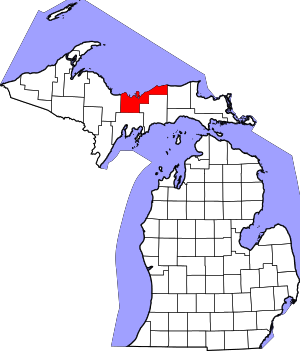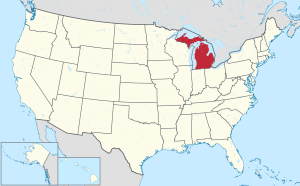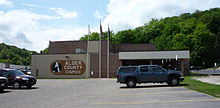This is the current revision of this page, as edited by PiperLeeBob (talk | contribs) at 15:12, 27 November 2024 (Updated 2024 third party results). The present address (URL) is a permanent link to this version.
Revision as of 15:12, 27 November 2024 by PiperLeeBob (talk | contribs) (Updated 2024 third party results)(diff) ← Previous revision | Latest revision (diff) | Newer revision → (diff) For the community in Arenac County, see Alger, Michigan.County in Michigan, United StatesCounty in Michigan
| Alger County | |
|---|---|
| County | |
 Lake Superior from Pictured Rocks National Lakeshore Lake Superior from Pictured Rocks National Lakeshore | |
 Flag Flag Seal Seal | |
 Location within the U.S. state of Michigan Location within the U.S. state of Michigan | |
 Michigan's location within the U.S. Michigan's location within the U.S. | |
| Coordinates: 47°10′N 86°29′W / 47.16°N 86.48°W / 47.16; -86.48 | |
| Country | |
| State | |
| Founded | March 17, 1885 |
| Named for | Russell A. Alger |
| Seat | Munising |
| Largest city | Munising |
| Area | |
| • Total | 5,048 sq mi (13,070 km) |
| • Land | 915 sq mi (2,370 km) |
| • Water | 4,133 sq mi (10,700 km) 82% |
| Population | |
| • Total | 8,842 |
| • Density | 10/sq mi (4/km) |
| Time zone | UTC−5 (Eastern) |
| • Summer (DST) | UTC−4 (EDT) |
| Congressional district | 1st |
| Website | https://www.algercounty.gov/ |
Alger County (/ˌældʒər/ AL-jər) is a county in the Upper Peninsula of the U.S. state of Michigan. As of the 2020 Census, the population was 8,842. It is the state's second-largest county by area, including the waters of Lake Superior. The county seat is Munising.
Alger County is home to Pictured Rocks National Lakeshore, which features rock formations, waterfalls, and sand dunes along the shore of Lake Superior. Much of the county is also part of the Hiawatha National Forest.

History
Alger County was detached from Schoolcraft County, set off and organized in 1885. The county was named for lumber baron Russell Alexander Alger, who was elected as a Michigan Governor, and US Senator, and appointed as US Secretary of War during the William McKinley Presidential administration. See also, List of Michigan county name etymologies, List of Michigan counties, and List of abolished U.S. counties.
Geography
According to the U.S. Census Bureau, the county has a total area of 5,048 square miles (13,070 km), of which 915 square miles (2,370 km) is land and 4,133 square miles (10,700 km) (82%) is water. It is the second-largest county in Michigan by total area, mainly because of Lake Superior on the north side of the county.
Highways
 US 41
US 41 M-28
M-28 M-67
M-67 M-77
M-77 M-94
M-94 H-01
H-01 H-03
H-03 H-05
H-05 H-11
H-11 H-13
H-13 H-15
H-15 H-44
H-44 H-52
H-52 H-58, passes through Pictured Rocks National Lakeshore.
H-58, passes through Pictured Rocks National Lakeshore. FFH 13
FFH 13
Adjacent counties
By land
- Luce County – east
- Schoolcraft County – southeast
- Delta County – south
- Marquette County – west
By water
- Thunder Bay District, Ontario – north
National protected areas
- Grand Island National Recreation Area
- Hiawatha National Forest (part)
- Pictured Rocks National Lakeshore
Demographics
| Census | Pop. | Note | %± |
|---|---|---|---|
| 1890 | 1,238 | — | |
| 1900 | 5,868 | 374.0% | |
| 1910 | 7,675 | 30.8% | |
| 1920 | 9,983 | 30.1% | |
| 1930 | 9,327 | −6.6% | |
| 1940 | 10,167 | 9.0% | |
| 1950 | 10,007 | −1.6% | |
| 1960 | 9,250 | −7.6% | |
| 1970 | 8,568 | −7.4% | |
| 1980 | 9,225 | 7.7% | |
| 1990 | 8,972 | −2.7% | |
| 2000 | 9,862 | 9.9% | |
| 2010 | 9,601 | −2.6% | |
| 2020 | 8,842 | −7.9% | |
| 2023 (est.) | 8,757 | −1.0% | |
| US Decennial Census 1790-1960 1900-1990 1990-2000 2010-2018 | |||
The 2010 United States census indicates Alger County had a population of 9,601. The racial makeup of the county was 86.3% White, 6.4% Black or African American, 4.1% Native American, 0.3% Asian, 0.1% of some other race and 2.7% of two or more races; of them 1.2% were Hispanic or Latino (of any race). Regarding specific ethnicities, 15.7% of the population was of German heritage, 13.5% Finnish, 12.6% French, French Canadian or Cajun, 9.3% English, 7.3% Polish, 6.9% Irish and 5.3% American ancestry. In 2020, the county had a population of 8,842.
In 2010, there were 3,898 households, out of which 20.1% had children under the age of 18 living with them, 52.2% were married couples living together, 7.1% had a female householder with no husband present, and 36.4% were non-families. 31.6% of all households were made up of individuals, and 15.2% had someone living alone who was 65 years of age or older. The average household size was 2.2 and the average family size was 2.74. In the county, the population was spread out, with 17.1% under the age of 18, 6.6% from 18 to 24, 22.8% from 25 to 44, 32.8% from 45 to 64, and 20.7% who were 65 years of age or older. The median age was 47.3 years. The population was 54.4% male and 45.6% female.
In 2010, the median income for a household in the county was $38,231, and the median income for a family was $46,154. The per capita income for the county was $19,858. About 9.3% of people in families and 14.0% of the population were below the poverty line, including 19.3% of those under age 18 and 8.2% of those age 65 or over. The 2021 census estimates showed the county had a median household income of $48,822.
Government
The county government operates the jail, maintains rural roads, operates local courts, records deeds, mortgages, and vital records, administers public health regulations, and participates with the state in the provision of welfare and other social services. The county board of commissioners controls the budget and has limited authority to make laws or ordinances. In Michigan, most local government functions — police and fire, building and zoning, tax assessment, street maintenance, etc. — are the responsibility of individual cities and townships.
Politics
Alger County was reliably Republican from the beginning through 1928. Since then it has voted for the Democratic nominee 67% (16 of 24) of the time, though it has voted Republican in the last four elections.
| Year | Republican | Democratic | Third party(ies) | |||
|---|---|---|---|---|---|---|
| No. | % | No. | % | No. | % | |
| 2024 | 3,116 | 59.26% | 2,075 | 39.46% | 67 | 1.27% |
| 2020 | 3,014 | 58.70% | 2,053 | 39.98% | 68 | 1.32% |
| 2016 | 2,585 | 57.22% | 1,663 | 36.81% | 270 | 5.98% |
| 2012 | 2,330 | 50.45% | 2,212 | 47.90% | 76 | 1.65% |
| 2008 | 2,188 | 46.06% | 2,472 | 52.04% | 90 | 1.89% |
| 2004 | 2,318 | 48.65% | 2,395 | 50.26% | 52 | 1.09% |
| 2000 | 2,142 | 49.06% | 2,071 | 47.43% | 153 | 3.50% |
| 1996 | 1,429 | 33.77% | 2,229 | 52.68% | 573 | 13.54% |
| 1992 | 1,471 | 32.19% | 2,144 | 46.91% | 955 | 20.90% |
| 1988 | 1,830 | 45.08% | 2,210 | 54.45% | 19 | 0.47% |
| 1984 | 2,175 | 51.69% | 2,018 | 47.96% | 15 | 0.36% |
| 1980 | 2,059 | 44.31% | 2,242 | 48.25% | 346 | 7.45% |
| 1976 | 1,722 | 41.38% | 2,379 | 57.17% | 60 | 1.44% |
| 1972 | 2,035 | 52.48% | 1,803 | 46.49% | 40 | 1.03% |
| 1968 | 1,406 | 40.03% | 1,927 | 54.87% | 179 | 5.10% |
| 1964 | 1,010 | 26.90% | 2,743 | 73.05% | 2 | 0.05% |
| 1960 | 1,663 | 41.68% | 2,321 | 58.17% | 6 | 0.15% |
| 1956 | 2,070 | 49.37% | 2,105 | 50.20% | 18 | 0.43% |
| 1952 | 2,066 | 49.68% | 2,058 | 49.48% | 35 | 0.84% |
| 1948 | 1,702 | 42.73% | 2,009 | 50.44% | 272 | 6.83% |
| 1944 | 1,504 | 37.26% | 2,519 | 62.41% | 13 | 0.32% |
| 1940 | 1,629 | 34.84% | 2,984 | 63.83% | 62 | 1.33% |
| 1936 | 1,291 | 30.67% | 2,824 | 67.09% | 94 | 2.23% |
| 1932 | 1,354 | 36.69% | 2,111 | 57.21% | 225 | 6.10% |
| 1928 | 1,716 | 59.05% | 1,053 | 36.24% | 137 | 4.71% |
| 1924 | 1,623 | 66.52% | 228 | 9.34% | 589 | 24.14% |
| 1920 | 1,263 | 66.09% | 468 | 24.49% | 180 | 9.42% |
| 1916 | 687 | 48.31% | 650 | 45.71% | 85 | 5.98% |
| 1912 | 290 | 26.56% | 263 | 24.08% | 539 | 49.36% |
| 1908 | 997 | 75.59% | 231 | 17.51% | 91 | 6.90% |
| 1904 | 1,081 | 81.40% | 204 | 15.36% | 43 | 3.24% |
| 1900 | 1,017 | 69.90% | 415 | 28.52% | 23 | 1.58% |
| 1896 | 801 | 58.42% | 539 | 39.31% | 31 | 2.26% |
| 1892 | 160 | 50.31% | 156 | 49.06% | 2 | 0.63% |
| 1888 | 284 | 62.28% | 162 | 35.53% | 10 | 2.19% |
Communities

City
- Munising (county seat)
Village
Civil townships
- Au Train Township
- Burt Township
- Grand Island Township
- Limestone Township
- Mathias Township
- Munising Township
- Onota Township
- Rock River Township
Census-designated place
Unincorporated communities
- Au Train
- Christmas
- Coalwood
- Deerton
- Diffin
- Dixon
- Dorsey
- Doty
- Eben Junction
- Evelyn
- Forest Lake
- Green Haven
- Indian Town
- Juniper
- Kentucky
- Kiva
- Ladoga
- Limestone
- Mantila Camp
- Melstrand
- Munising Junction
- Myren
- Onota
- Rock River
- Rumely
- Sand River
- Shingleton
- Slapneck
- Star
- Stillman
- Sullivans Landing
- Sundell
- Sunrise Landing
- Traunik
- Trenary
- Vail
- Van Meer
- Wetmore
- Williams Crossing
- Williams Landing
- Winters
Other locations
- Bay Furnace (1869–1940)
Indian reservations
- Alger County contains two very small portions of the Sault Tribe of Chippewa Indians tribal community, which is headquartered in Sault Ste. Marie in Chippewa County. One portion is in the northeastern corner of Au Train Township, and another slightly larger portion is about two miles south of Munising in Munising Township.
See also
- List of Michigan State Historic Sites in Alger County, Michigan
- National Register of Historic Places listings in Alger County, Michigan
References
- ^ "Bibliography on Alger County". Clarke Historical Library, Central Michigan University. Retrieved July 2, 2013.
- ^ "State & County QuickFacts". US Census Bureau. Retrieved September 15, 2021.
- "Find a County". National Association of Counties. Archived from the original on May 31, 2011. Retrieved June 7, 2011.
- "2010 Census Gazetteer Files". US Census Bureau. August 22, 2012. Archived from the original on November 13, 2013. Retrieved September 18, 2014.
- "Annual Estimates of the Resident Population for Counties: April 1, 2020 to July 1, 2023". United States Census Bureau. Retrieved April 4, 2024.
- "US Decennial Census". US Census Bureau. Retrieved September 18, 2014.
- "Historical Census Browser". University of Virginia Library. Retrieved September 18, 2014.
- "Population of Counties by Decennial Census: 1900 to 1990". US Census Bureau. Retrieved September 18, 2014.
- "Census 2000 PHC-T-4. Ranking Tables for Counties: 1990 and 2000" (PDF). US Census Bureau. Archived (PDF) from the original on March 27, 2010. Retrieved September 18, 2014.
- "U.S. Census website". Retrieved July 6, 2013.
- "U.S. Census website".
- Leip, David. "Dave Leip's Atlas of US Presidential Elections". uselectionatlas.org. Retrieved April 8, 2018.
- United States Census Bureau (2000). "Michigan County Subdivision Outline Map" (PDF). Archived (PDF) from the original on June 9, 2011. Retrieved April 13, 2018.
External links
- Alger County Online
- Greater Munising Bay Partnership for Commerce Development & Alger County Chamber
- National Association of Counties - Alger County, MI
- Alger County Sheriff's Office
- US Coast Guard Auxiliary Flotilla 26-12
- "Bibliography on Alger County". Clarke Historical Library, Central Michigan University. Retrieved July 2, 2013.
| Places adjacent to Alger County, Michigan | ||||||||||||||||
|---|---|---|---|---|---|---|---|---|---|---|---|---|---|---|---|---|
| ||||||||||||||||
| Municipalities and communities of Alger County, Michigan, United States | ||
|---|---|---|
| County seat: Munising | ||
| City |  | |
| Village | ||
| Civil townships | ||
| CDP | ||
| Other communities |
| |
| Indian reservation | ||
| Footnotes | ‡This populated place also has portions in an adjacent county or counties | |
| Upper Peninsula of Michigan | |
|---|---|
| Central cities | |
| Counties |
|
| Geography | |
| Transportation | |
| Economy | |
47°10′N 86°29′W / 47.16°N 86.48°W / 47.16; -86.48
Categories: